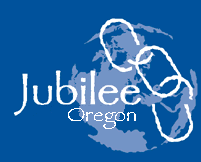January 25, 2007
After a very early morning flight on a very professional Kenya Airlines from Nairobi to Lusaka, Zambia we met up with Jubilee Zambia and the network of Civil Society for Poverty Eradication (CSPR.org.zm) at Jubilee Zambia’s home in The Jesuit Center for Theological Reflection (JCTR). Nanchila Nancolo, the Jubilee-Zambia Coordinator, provided us with a very comprehensive description of the current debt situation.
As is typical of the IMF, the Zambian Government was required to insitute a conditionality of freezing wages and hiring freezes for many years. For example, University professors had to wait two years to be paid. When there were funds to hire teachers or doctors, the wages were so low the government could not recruit anyone. The “Brain Drain” is significant. The debt relief received so far will help, but Jubilee Zambia is concerned about continued borrowing by the government to meet budget deficits, lack of transparency, no parliamentary oversight and a lack of political will to stand up to the IMF.
Jubilee Zambia wants transparency in all loan contracts, parliamentary oversight, monitoring of the use of the debt, reform to the trade sector so it benefits the country and local ownership of economic policies.
Chris…from JCTR presented their basic needs market basket analysis of the monthly income needed for a family of six in Lusaka to afford basic food and housing. The needed monthly income to meet basic needs is $366 per family per month, or $2 per person. In fact, wages, for those few who have jobs, averages much less. For example, a government secretary earns between $150 to $250 per month. In a country of 11.9 million people, only 470,000 have jobs in the formal employment sector.
For Zambia to get its partial debt cancellation, the government had to fulfill the conditionalities imposed by the IMF. One key requirement was privitization of government owned companies. The Zambian National Commercial Bank is a good example. It is the only bank in many rural areas. Since private companies are totally profit driven, if a rural branch is not profitable, it will be closed. This will have a huge impact on the agricultural sector and micro finance schemes. Imagine not having a bank in your town and having to travel for hours to get to a bank. The Zambian people are very upset about it, but the government had to agree with the IMF conditionality or it would not get debt relief.
When a government owned company, like a copper mine, is privatized, the company who is buying it gets a tax holiday for 5 years. We were told by CSPR that many times these companies leave when the five years are up. The new corporation who buys the company gets a NEW 5 year tax holiday. And on it goes.
Copper is a significant mineral for Zambia. Prices are up, but the government only gets royalties of 3.6%. The people of Zambia get toxic spills into their rivers. A clear case of environmental debt.
Like our home state of Oregon, Zambian workers contribute more tax revenue than the corporations. But that tax burden is carried by less than 500,000 people.
The IMF is now recommending a 17.5% value added tax on food, agricultural input, newsprint, fuel, mosquito nets and other basic needs. The citizenry is very much opposed to it, but it is yet to be seen if the government will stand up to the IMF on this “recommendation”.
Next Tuesday we will meet with the IMF and ask them a few questions about the tax on basic goods and the tax exemption enjoyed by corporations.

No comments:
Post a Comment